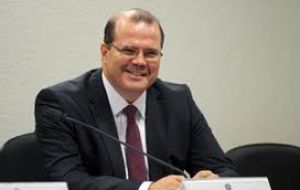MercoPress. South Atlantic News Agency
Brazil lowers basic rate half a point for a second time running to 11.5%
 Inflation converging to the 2012 target said Alexandre Tombini
Inflation converging to the 2012 target said Alexandre Tombini Brazil’s central bank cut borrowing costs by half a point for a second straight meeting. The bank’s board, led by President Alexandre Tombini, voted unanimously to reduce the benchmark Selic rate to 11.5% from 12% percent.
The central bank “understands that to mitigate in a timely way effects coming from a more restrictive global environment, a moderate adjustment in the level of the basic rate of interest is consistent with the scenario of the convergence of inflation to the target in 2012,” policy makers said in their statement accompanying their decision late Wednesday night.
Policy makers are betting that slowing global demand will offset the stimulus provided by lower borrowing costs and curb the fastest inflation in six years, said Gustavo Rangel, chief Brazil economist for ING Financial Markets.
Across Latin America, no other central bank has lowered rates since Colombia did 18 months ago, and in the Group of 20 nations Turkey has also cut its benchmark rate in response to the global crisis.
The central bank raised rates five times this year as near record-low unemployment and a credit boom fuelled inflation that in April topped the 6.5% upper limit of the bank’s target range. Inflation continued to accelerate even as concerns over a global slowdown led policy makers to reverse course in August; prices in September rose 7.31% from a year ago.
Traders expect the bank to cut rates by an additional 1.25 percentage point by April, according to estimates based on interest rate futures yields.
Inflation expectations have jumped since the August rate cut, and economists now expect Brazil to miss its inflation target this year for the first time since 2003, according to an October 14 Central bank survey.
Brazil’s economy is showing signs of cooling. Retail sales in August fell the most since March 2009, while industrial production registered its third fall in five months. Business confidence and the purchasing manufacturer’s index fell to its lowest level since 2009.
The price of iron ore, the country’s biggest export, has fallen 18% since the start of September as demand weakened in China.
The economic activity index, a proxy for GDP, shrank 0.53% in August, its biggest decline since the global financial crisis of 2008. Analysts expect the economy to grow no more than 3.6% this year and next, down from the 7.5% pace in 2010 that was the fastest in two decades, according to the most recent central bank survey.
The benchmark Bovespa stock index has declined 18% in dollar terms since the end of July, more than the MSCI Emerging Markets Index. The real has weakened 13% since the start of August.




Top Comments
Disclaimer & comment rulesCommenting for this story is now closed.
If you have a Facebook account, become a fan and comment on our Facebook Page!